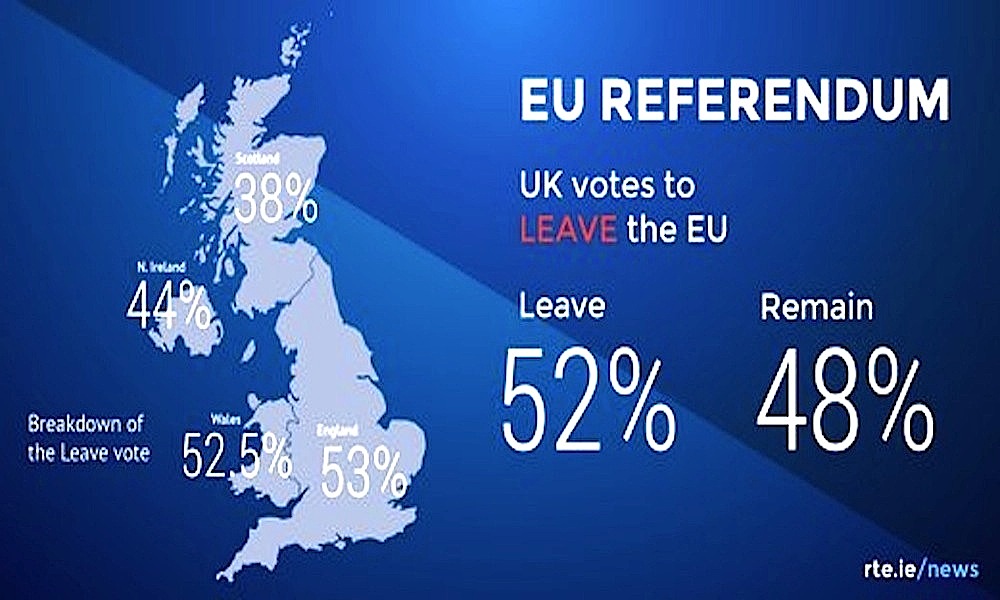
Irish Travel Trade News asked a number of people in the travel industry for their initial responses to the Brexit vote to take the UK out of the EU by 52% for leave to 48% for remain.
Cormac Meehan, ITAA President
“It cannot be doubted that Europe is moving into a period of uncertainty in terms of its relationship with the UK. Given the two-year adjustment period from the day that the British formally notify the EU of their intention to leave the EU, there is adequate time to prepare for an orderly market adjustment, provided that all the relevant stakeholders, particularly in the travel industry, co-operate.
“There are two distinct areas of challenge: the potential volatility of currency exchange rates and the uncertainty in relation to frontier control mechanisms, both at the land border with Northern Ireland and at airports and ports serving the UK in Ireland.
“A weak Sterling currency could impact on the significant number of people using both Dublin and Ireland West International Airports for leisure, business and transit/transfer travel. In the case of both airports a reduction in traffic volumes could have a direct negative impact on revenues. The corollary could be that more major international airlines and tour operators could come to use Ireland as a hub and departure point. This may have regulatory implications for some stakeholders. Border controls, no matter how soft can inhibit and impede free movement and transit.
“The ITAA plans to work proactively with our colleagues in ABTA and liaise with the agencies and Government Departments, representing all ITAA members, particularly those on the Border, to ensure that their customers’ rights are protected and their obligations are met. I can assure you that we will endeavour to influence Government decisions to the benefit of our members and, through them, the travelling public.”
Jim Vaughan, JustSplit.com
“Given the response of the financial markets, it is clear that investors and business leaders see that the Brexit decision will damage economic performance in a fundamental way.
“For the retail travel agent, there are many practical issues that will arise in time as a result of Brexit. In particular our working arrangements with our UK-based suppliers, ranging from airlines to cruise companies and others, are likely to be impacted on. While these things will be negotiated over time, Brexit will create an air of uncertainty and that is bad for business. Having worked through the past eight years of recession in Ireland, I know that the last thing our industry needs is more uncertainty.
“We also need our customers to be confident in their ability to spend money on holidays. So I hope that our Government and our European partners recognise what needs to be done to maintain that confidence and agree a new working arrangement with the UK as soon as possible.”
Aer Lingus Owner IAG
Aer Lingus owner IAG was big loser on the stock market, falling 23% after it issued a profit warning following the referendum outcome. In a statement, it said:
“IAG believes that the vote to leave the European Union will not have a long-term material impact on its business. In the short term, however, in the run up to the UK referendum during June, IAG experienced a weaker than expected trading environment. Following the outcome of the referendum, and given current market volatility, while IAG continues to expect a significant increase in operating profit this year, it no longer expects to generate an absolute operating profit increase similar to 2015.
“IAG will update the market in due course.”
Shaun Quinn, Chief Executive, Fáilte Ireland
“With the outcome of the referendum now decided, it is much too early to speculate on the long-term consequences of the result for tourism in the British market. In the immediate term, however, performance will be obviously influenced by any volatility in exchange rates.
“Fortunately for Irish tourism, visitor markets in the USA and Mainland Europe have been performing strongly and are expected to continue to grow. The British market has performed well so far this year, but today’s result underscores the need for the Irish tourism sector to maintain a strong competitive position.
“In line with the Government’s contingency plans, Fáilte Ireland will be monitoring any short-term impacts of a devalued Sterling on tourist numbers to Ireland and working with businesses in the sector to develop strategies to address any arising competitiveness challenges.
“In 2015, Ireland received 3.5 million visitors from the British market, which generated just over €1 billion in tourism revenue. Mainland Europe represented 36% of all tourism revenue, North America provided 28% of revenue and 24% came from Britain, the balance (12%) coming from all other markets.”
Mary Denton, Sunway
“The main effect of Brexit will be the drop in the value of sterling relative to the euro and dollar. While this could have a major effect on inward tourism from sterling areas, it should have no effect on the cost of holidays from the Republic to non-sterling areas.
“It is difficult to quantify what effect the final agreement between the UK and the Eurozone will have on the open skies and general trade agreements.
“Unfortunately, it will cause a lot of uncertainty and uncertainty usually means a drop in consumer confidence, and causes people to postpone purchasing decisions in the short term such as holidays.”
Tony Tyler, IATA Chief Executive
“The Brexit vote has triggered much uncertainty – financial and otherwise. As leaders in the UK and the EU work to establish a new framework for their relationship, one certainty to guide them is the need and desire of people on both sides of that relationship to travel and trade. Air transport plays a major role in making that possible. There were 117 million air passenger journeys between the UK and the EU in 2015. Air links facilitate business, support jobs and build prosperity. It is critical that whatever form the new UK-EU relationship takes, it must continue to ensure the common interests of safe, secure, efficient and sustainable air connectivity.”
The International Air Transport Association released preliminary analysis of the financial and economic impact of the Brexit decision on the air transport industry. The main points of the report are:
- The UK has voted to leave the EU – the so-called ‘Brexit’ scenario. Considerable uncertainty remains regarding the precise detail of the exit and it could be two years or more before these issues are fully resolved; prolonged uncertainty will influence both the magnitude and persistence of the economic impacts.
- Preliminary estimates suggest that the number of UK air passengers could be 3-5% lower by 2020, driven by the expected downturn in economic activity and the fall in the sterling exchange rate. The near-term impact on the UK air freight market is less certain, but freight will be affected by lower international trade in the longer term.
- A big issue is with aviation regulation. The UK faces a trade-off between accessing the European Single Aviation Market and having the policy freedom to set its own regulations.




